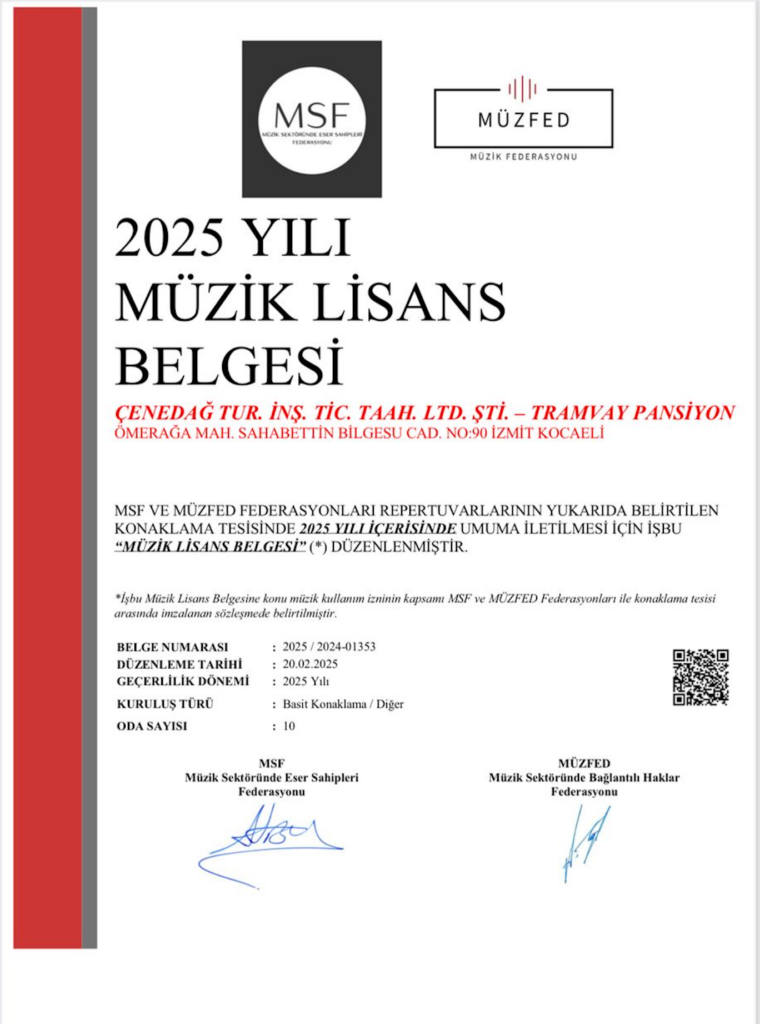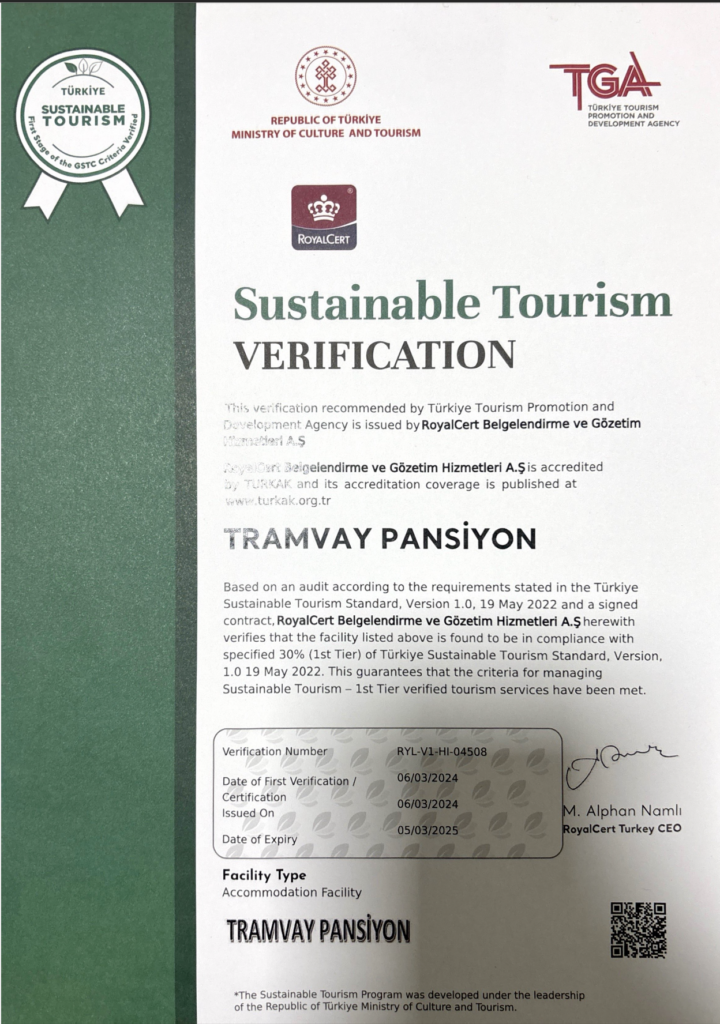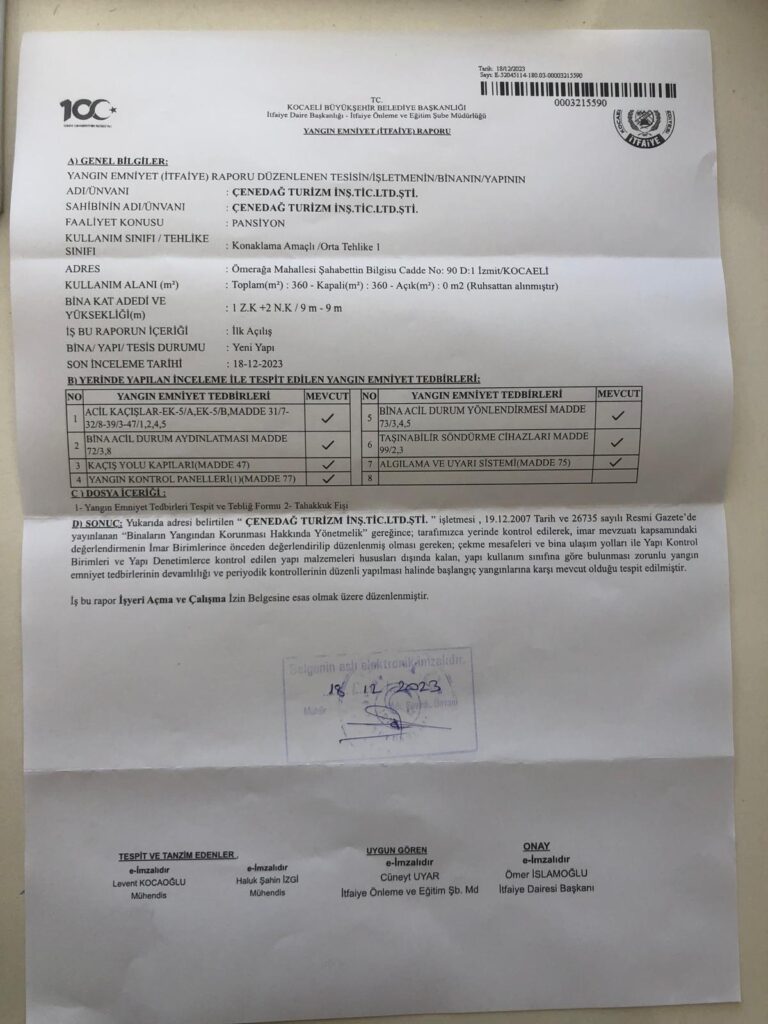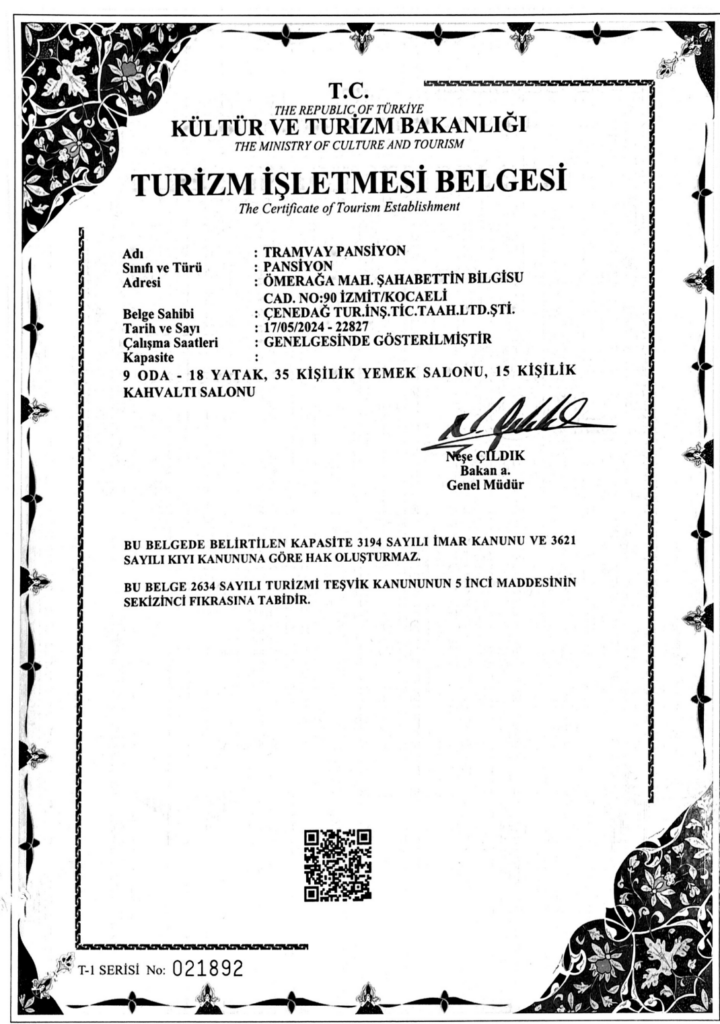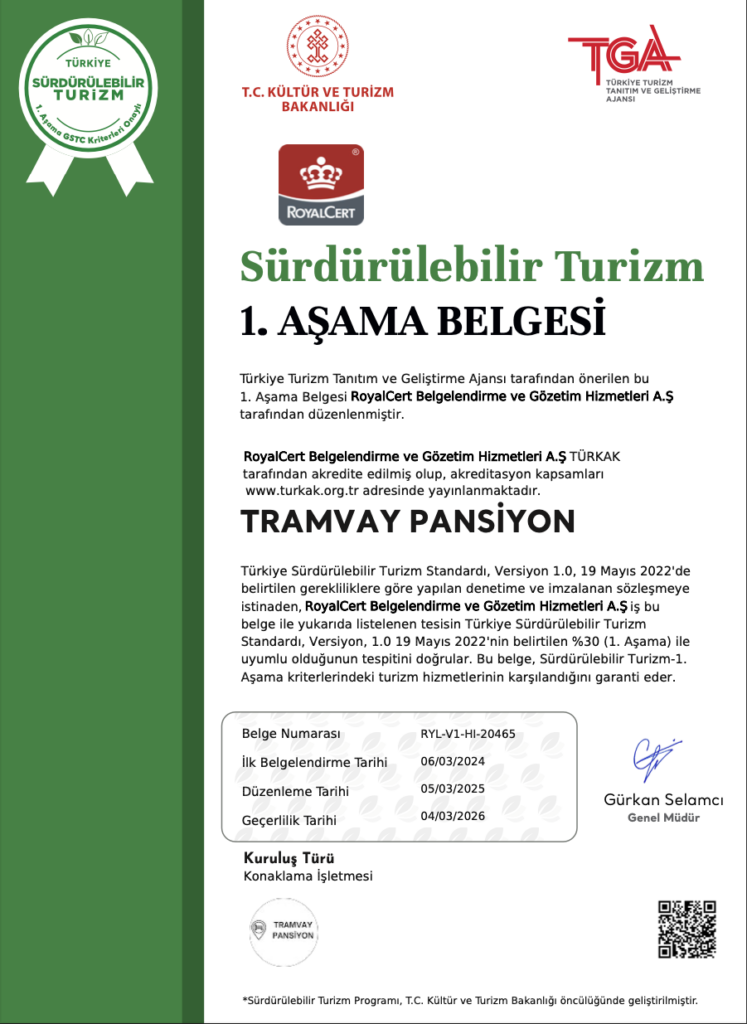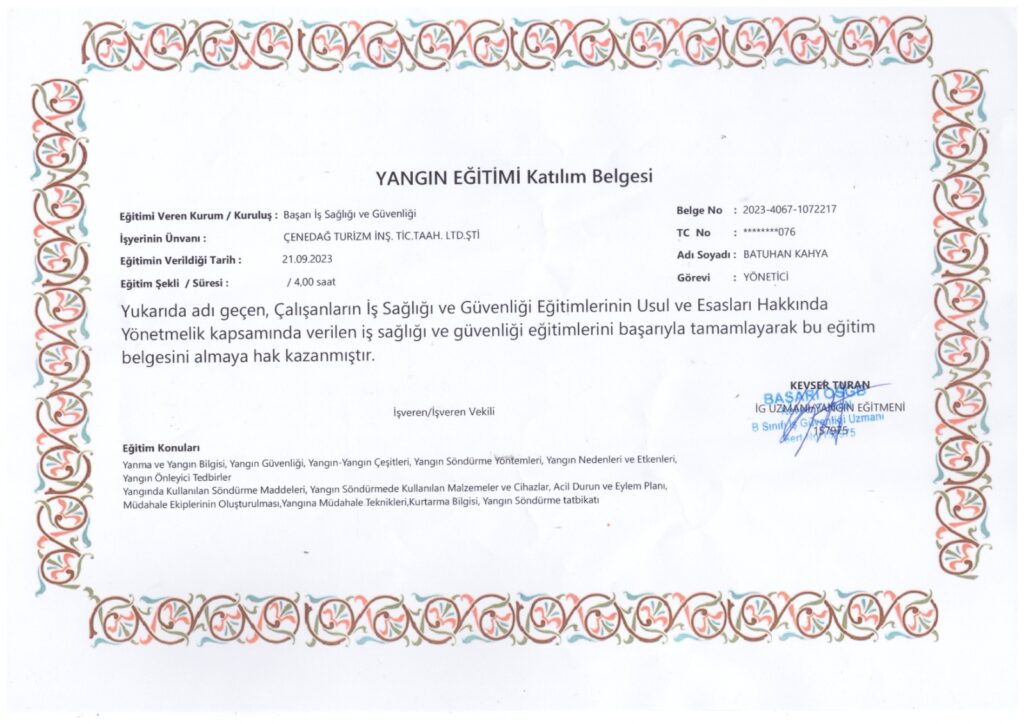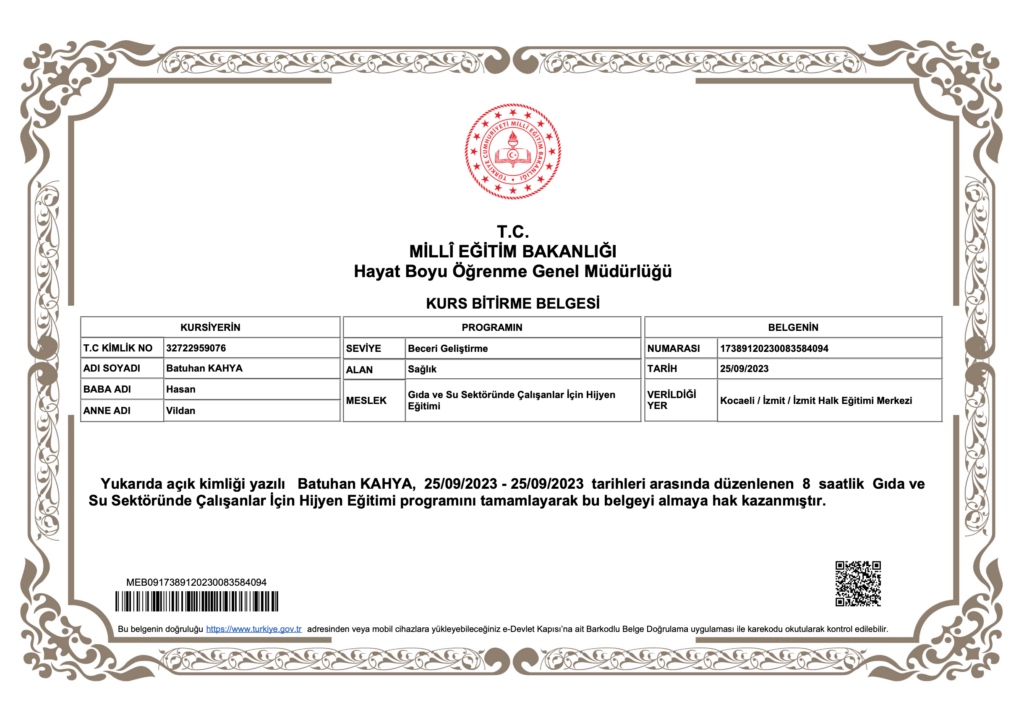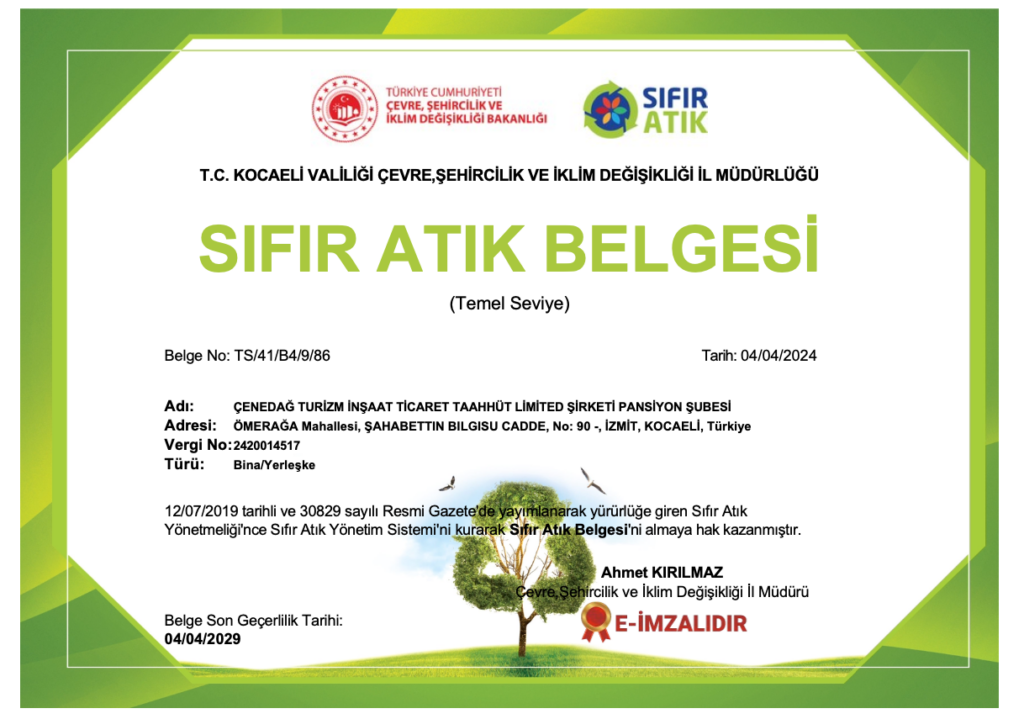INFORMATION FOR DISABLED GUESTS
Dear Guests,
At Tramvay Pansiyon, we strive to provide a comfortable and enjoyable accommodation experience. However, due to the structure of our building, we do not have suitable accessibility options for our disabled guests.
Our pension is a multi-story building and does not have facilities such as an elevator or special access ramps. Additionally, access between the entrance and floors is only possible via stairs. Therefore, accessibility may be insufficient for wheelchair users and guests with limited mobility.
Prioritizing the safety and comfort of our guests, we would be happy to provide suggestions for alternative accommodation options suitable for disabled access. Please feel free to contact us for more information.
Tramvay Hostel Management
SUSTAINABILITY COMMITMENT
Tramvay Hostel, as a tourism-certified establishment, does not have any ongoing construction projects in our current building. However, we commit to adhering to the principle of sustainability in any future structural modifications, landscaping efforts, or renovation processes that may be deemed necessary.
In this regard:
- Protection of Natural and Cultural Environment
- All projects will be carried out with consideration for the region’s natural and cultural heritage.
- Visual integrity, landscaping, and the absorption capacity of ecosystems will be taken into account.
- No negative impact will be caused to protected and sensitive areas.
- Preservation of Biodiversity and Ecosystems
- The integrity of archaeological sites, cultural heritage areas, and sacred regions will be preserved.
- Endangered or protected species will not be displaced.
- Waterways, water catchment areas, and wetlands will be protected, and surface runoff management will be conducted in line with environmental sustainability principles.
- Risk Management and Impact Assessment
- Risk analyses will be conducted concerning climate change, natural disasters, and visitor safety.
- Before any modifications or construction work, impact assessments will be conducted, and the processes will be documented and recorded.
- Sustainable Materials and Practices
- Materials used will be natural and sustainable, sourced from local and regional suppliers.
- In landscaping, exotic and invasive species will be avoided, and native and drought-resistant plants will be preferred.
- Sustainable design, materials, and construction practices in buildings will adhere to the highest possible environmental certifications.
- Any waste generated during construction and renovation will be sorted and disposed of in an environmentally responsible manner.
With this commitment, Tramvay Hostel declares that we will adhere to sustainability principles in all future construction, modification, and renovation activities.
Tramvay Hostel Management
ACTION PLAN & EXIT DIRECTIVES IN CASE OF FIRE AND DISASTER
Dear Guest,
Your safety is our top priority. In case of a fire or disaster, it is crucial to follow the guidelines below.
1. IN CASE OF FIRE
- If you notice signs of fire (smoke, smell, or flames), immediately inform the reception (Phone: +90 555 231 44 16).
- Leave your room immediately and use the exit stairs to proceed to the main entrance.
- Close your door but do not lock it.
- If you are in a smoke-filled area, move by crouching or crawling.
- If the exit route is blocked, seal the door gaps with a wet towel or cloth and wait for help near the window.
2. IN CASE OF EARTHQUAKE OR NATURAL DISASTER
- Do not panic during shaking and do not rush to the stairs.
- Protect your head by crouching next to a sturdy table or bed.
- Once the shaking stops, move towards the exit.
- Do not touch electrical switches, water, or gas valves.
- Evacuate the building quickly but carefully and proceed to the designated assembly area in front of the hostel.
3. EMERGENCY ASSEMBLY AREA
- All guests and staff should gather in the open area in front of the hostel entrance.
- Follow the instructions of the responsible staff.
- Do not re-enter the building until authorities give permission.
Remember:
In any emergency, stay calm, do not put yourself at risk, and follow the instructions of the hostel staff.
Emergency Contact Numbers:
- Hostel Reception: +90 555 231 44 16
- Fire Department: 110
- Ambulance: 112
- Police: 155
Tramvay Hostel Management
SUSTAINABILITY REPORTING
About the Report
Tramvay Hostel started its operations in February 2025 and simultaneously implemented its sustainability plans. Our goal is to be a cleaner, more energy-efficient business that provides the highest level of satisfaction to our guests.
This report has been prepared to track our sustainability efforts throughout 2025, evaluate progress, and help us achieve our goals.
As of 2025, we have begun our sustainability efforts. In this regard, we aim to share our progress with our management, employees, guests, suppliers, and all other partners, increasing awareness and turning it into shared goals and successes.
Facility Introduction and Features
(Room count, social areas, pool, aquapark, restaurant, bar, service duration throughout the year can be shared.)
- Location: Operating as a boutique hotel in the city center.
- Indoor Area: A 3-story building with a total area of 300 m².
- Number of Rooms: 9 rooms (each 20 m²).
- Social Areas: Kitchen and lounge area on the ground floor.
- Service Duration: Open throughout the year.
Sustainability Team
Sustainability efforts at Tramvay Hostel are led by the business manager, Ilker Gacar. All staff contribute to sustainability practices and take responsibility in line with the set goals.
Reducing Environmental Impact
- Waste Management: Sorting bins for glass, paper, plastic, and metal waste are available.
- Water Management: Water-saving fixtures are used.
- Energy Management: Energy-saving LED bulbs are used in all areas.
- Chemical Management: Environmentally friendly cleaning products from well-known brands are used.
Personnel and Work Life
- Number of Employees: 4 (3 men, 1 woman).
- Employment Policy: All employees are from the local community.
- Training: Reception staff have attended training under the GTSC (Green Tourism Sustainability Certification). Additionally, the team continuously researches and integrates new sustainability practices into their workflows.
Social Initiatives
Support for the Local Economy: All purchases are made from local suppliers, contributing to the regional economy.
Cultural Activities:
As a city hotel, direct cultural services are not provided. However, guests are informed about cultural and natural opportunities in the city and surrounding areas, encouraging them to explore these options.
Conclusion:
Tramvay Hostel is committed to sustainability principles by reducing environmental impacts, contributing to the local economy, and offering guests a more conscious accommodation experience. We will continue our efforts in line with our 2025 goals and track our progress.
PRIVACY POLICY
This notification is made in accordance with Article 10 of the Law No. 6698 on the Protection of Personal Data and within the framework of legal obligations.
Our website is SSL certified.
As of April 7, 2016, the Law No. 6698 on the Protection of Personal Data (“Law”) has come into effect, and our Company acts as the Data Controller, fulfilling the obligations required by this status through necessary compliance efforts.
The personal data provided to our Company to receive services/products or obtained through various channels by our Company are processed as a “Data Controller” within the framework of the “Law on the Protection of Personal Data”.
Your personal data will be stored by our Company in accordance with this Law and processed within the scope of your consent. We would like to emphasize that your personal data may be used by us to provide you with a better service experience, to conduct marketing, promotion, and informative communications regarding our products and services, to collect and compile statistical information, and to develop commercial activities.
Our Company places great importance on keeping customer information confidential and not sharing this information with third parties. All employees undertake to protect the confidentiality of the information obtained while performing their duties and to use this information only in accordance with the law and to fulfill their professional responsibilities.
Personal information related to you includes identification information such as name, surname, ID number, family status information, account information, IP, phone and address information, voice, etc., which can identify you.
Your personal data may be transferred to national and international authorized authorities/agencies, administrative and official bodies, all real and legal persons both domestically and abroad as stipulated by national and international legislation and contracts, and to independent audit companies and third parties due to legal obligations and legal restrictions.
COOKIES
Our Company uses cookies to facilitate the use of this website, apart from the original information sent to you. This way, it is possible for us to serve you better when you return to our website. Cookies are small text files sent to and stored on your computer to enable the continuous recognition of website users, to facilitate user access to the site, and to collect and compile aggregate data to improve and enhance the content of the sites.
Cookies are used to provide you with tailored and unique services or information that meets your needs and interests. The session control information contained in cookies will make it easier and faster for you to use our website and ensure that you can experience the web in the best conditions. The cookies on our site do not store or disclose personal information. The information transmitted via cookies is not used for any promotional or marketing purposes. Our web pages monitor usage patterns to improve the usability and effectiveness of our site through cookies. However, this information is absolutely never sold or shared with third parties. You can delete previously loaded cookies by making the necessary adjustments in your internet browser, as well as prevent future cookies from being loaded or enable your browser to warn you when cookies are being loaded.
However, we would like to emphasize that these cookies may be necessary for our website to function properly and fulfill certain functions. By using this site, you agree to be bound by this Privacy Statement. Our Company reserves the right to change this Privacy Statement at its discretion, to remove certain sections, or to add new sections. Continuing to use the website after changes to this Privacy Statement constitutes your commitment to accept the changes in this Privacy Statement.
You can exercise the rights listed below at any time by applying to our Company, which is the Data Controller, under Article 11 of the Law. Accordingly, our customers whose personal data are processed have the right to;
– Learn whether their personal data is being processed,– Request information regarding their processed personal data,– Learn the purpose of processing their personal data and whether it is used in accordance with that purpose,– Know the third parties to whom their personal data has been transferred, request correction of any inaccuracies in their personal data, and if the data has been transferred, request that the relevant third party be informed of this correction,– Request deletion, destruction, or anonymization of their personal data if the reasons for processing have ceased to exist, and if the data has been transferred, request that this request be communicated to the third party to whom the data has been transferred,– Object to any unfavorable result arising from the processed data concerning them,– Request compensation for damages arising from unlawful data processing under the law.
You can communicate these requests to our Company via the email address on our contact page.
You can review our Site Usage Agreement here, and you can edit your personal data that you have provided to us after logging in to your membership.
Tramvay Hostel
PROPERTY RIGHTS AND PROTECTION INSTRUCTIONS
Copyrights include the rights of individuals who create literary, musical, artistic works, and audiovisual products, films, computer programs, and software, as well as the secondary rights of performers, producers, and publishers, which are referred to as neighboring rights (or related rights) apart from the original producers.
Another important issue that arises while protecting these rights is the consideration of the public interest. While the rights of the owner of an intellectual property product are protected, the interests of society must also be taken into account. An intellectual property product is the result of the work, effort, investment, and expenses of the person or institution that invents or produces it. This person or institution naturally deserves to receive compensation for it, and others should not benefit from it without permission or without providing compensation. Otherwise, creativity will not be encouraged, and a motivating environment for new inventions and the emergence of new works of art will not be created in society. This is one aspect of the public interest in question. On the other hand, it is also important to note that every invention carries a share of humanity’s common knowledge, and ethically, that invention should be used for the benefit of all society, at least on the condition that the rights holder receives a reasonable profit. Furthermore, approaching every invention solely from a commercial and economic perspective and placing individuals’ interests above those of society, regardless of the cost, is another debatable issue. For instance, when a product related to human health is concerned, should priority be given to the patent holder’s rights or public health? If the price of a drug that could cure a deadly disease increases excessively due to patent protection and patients cannot obtain the medication, will priority be given to the patients’ right to live or the pharmaceutical company’s patent rights? If the invention does not provide sufficient profit to the patent holder, how will researchers be incentivized to work on new inventions, and how will companies be directed towards R&D activities? We can give different answers to these questions depending on our approach and values, but it should be stated that it is challenging to provide satisfactory answers to these questions, and these issues are being discussed, negotiated, and subject to disputes in different concrete situations.


